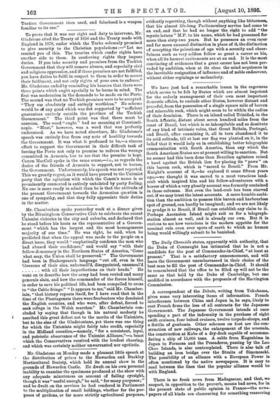Mr. Chamberlain spoke yesterday week at a dinner given by
the Birmingham Conservative Club to celebrate the recent Unionist victories in the city and suburbs, and declared that he stood before his hosts as the representative of a Govern- ment "which has the largest and the most homogeneous majority of our time." He was right, he said, when he predicted that when the appeal was made to the people on a direct issue, they would "emphatically condemn the men who had abused their confidence," and would say "with their fellow, democracy in the Northern States of America, Come what may, the Union shall be preserved." The Government had been in Shakespeare's language "cut off, even in the blossoms of their sins, unhousell'd, disappointed, unanneard
with all their imperfections on their heads." He went on to describe how the army had been routed and many generals slain, and how the commander of the forces himself, in order to save his political life, had been compelled to cross to "the Celtic fringe." "It appears to me," said Mr. Chamber- lain, "that history repeats itself, for I have read that in the time of the Plantagenets there were freebooters who desolated the English counties, and who were, after defeat, forced to seek refuge in the Welsh marches." Mr. Chamberlain con- cluded by saying that though in his natural modesty he ascribed this great defeat not to the merits of the Unionists, but to the sins of the Gladstonians, yet there was one thing for which the Unionists might fairly take credit, especially in the Midland counties,—namely, "for a consistent, loyal, and patriotic observance of the Unionist Alliance,"—a boast which the Conservatives received with the loudest cheering, and which was certainly neither unwarranted nor egotistic.


































 Previous page
Previous page